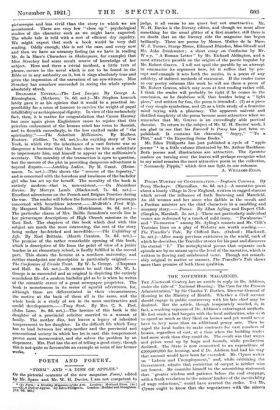READABLE NOVELS.—The Lost Lawyer. By George A. Birmingham. (Methuen. 7s.
6d. net.)—Mr. Stephen Leacoek lately gave it as his opinion that it would be a practical im- possibility for a sense of humour to survive the weight of papal infallibility or archiepiscopal dignity. In view of this melancholy fact, then, it is matter for congratulation that Canon Hannay has once again given Englishmen cause to rejoice that this priceless endowment of the human mind has room to flourish, and to flourish exceedingly, in the less exalted ranks of " the spirituality."—The Substitute Millionaire. By Hulbert Footner. (Collins. 7s. 6d. net.)—An exciting story of New York, in which city the inheritance of a vast fortune was so dangerous a business that the hero chose to hire a substitute to impersonate him, and himself to appear as the millionaire's secretary. The morality of the transaction is open to question, but the success of the plot in providing dangerous adventures is beyond dispute.—Latchkey Ladies. By M. Grant. (Heine. mann. 7s. net.)--This shows the " reverse of the tapestry," and is concerned with the boredom and loneliness of the bachelor girl who has set up for herself. The morality of the book is entirely modern—that is, non-existent.—On Hazardous Service. By Mervyn Lamb. (Blackwood. 7s. M. net.)— Excellent adventures on the French and Belgian Frontier during the war. The reader will follow the fortunes of all the personages concerned with breathless interest.—McBride's First Wife. By Margaret Baillie Saunders. (Hutchinson. 8s. 6d. net.)— The particular charm of Mrs. Baillie Saunders's novels lies in her picturesque descriptions of High Church missions in the East End. The chapters of this book which deal with this subject are much the most interesting, the rest of the story being rather far-fetched and incredible.--The Unfolding of Life. By Noel Brittain. (Heath Cranton. 7s. 6d. net.)— The promise of the rather remarkable opening of this book, which is descriptive of life from the point of view of a junior teacher in an elementary school, is Hardly fulfilled in the second part. This shows the heroine at a northern university, and neither standpoint nor description is particularly original.
The Confession of Ursula Trent. By W. L. George. (Chapman and Hall. 8s. 6d. net.)—It cannot be said that Mr. W, L. George is as successful and as original in depicting the entirely scandalous life of a modern bachelor girl as he is when he writes of the romantic career of a great newspaper proprietor. The book is monotonous in its series of squalid adventures, for, although these are differentiated in their circumstances, the motive at the back of them all is the same, and the whole book is a study of sex in its most unattractive and sordid developments.—Tony Sant. By Mrs. C. S. Peel. (John Lane. 8s. (3d. net.)—The heroine of this book is the daughter of a provincial solicitor married to a woman of family. The mother dies, but leaves a legacy of inherited temperament to her daughter. In the difficult life which Tony has to lead between her step-mother and the provincial and conventional society in which her lot is cast this temperament proves most inconvenient, and she solves the problem by an elopement. Mrs. Peel has the art of telling a good story, though this is not quite so favourable an example as some of her former works. •






































 Previous page
Previous page